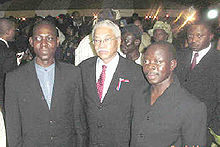Adams Oshiomhole
| Adams Aliyu Oshiomhole | |
|---|---|

Adams Oshiomhole, former President of the Nigeria Labour Congress (right) with U.S. Ambassador to Nigeria Howard F. Jeter (center), 5 July 2002, Lagos.
|
|
| Governor of Edo State | |
|
In office 12 November 2008 – 12 November 2016 |
|
| Preceded by | Oserheimen Osunbor |
| Succeeded by | Godwin Obaseki |
| Personal details | |
| Born |
4 April 1952 Iyamho, Western Region, British Nigeria (now Iyamho, Etsako West, Edo, Nigeria) |
Adams Aliyu Oshiomhole (born 4 April 1952) is a former labor leader, turned politician who 2012 was elected for a second term as the Governor of Edo State in Nigeria on the platform of the Action Congress . His first term was won following his court appeal to the results of a massively rigged April 2007 election in which the candidate of the ruling People's Democratic Party Oserheimen Osunbor had initially been declared the winner. He assumed office on 12 November 2008 after winning the appeal.
Oshiomhole was formerly president of the Nigeria Labour Congress (NLC), and was prominent as the leader of a campaign of industrial action against high oil prices in Nigeria.
Adams Aliyu Oshiomhole was born on 4 April 1952 at Iyamho, near Auchi in Edo State. He was born Muslim but was led to Christianity by his late wife Clara who died of cancer aged 54. He is Catholic and his Christian name is Eric. After his secondary education, he obtained a job with the Arewa Textiles Company, where he was elected union secretary. He became a full-time trade union organizer in 1975. He then studied at Ruskin College, Oxford in the United Kingdom where he majored in economics and industrial relations. He also attended the National Institute for Policy and Strategic Studies, Kuru. In May 2015 he married a young model called Lara Fortes
In 1982, Adams Oshiomhole was appointed General Secretary of the National Union of Textile Garment and Tailoring Workers of Nigeria, a union with over 75,000 workers. After democracy was restored in 1999, he became president of the Nigerian Labour Congress. Early in the administration of President Olusegun Obasanjo he negotiated a 25% wage increase for public sector workers. In return he publicly supported Obasanjo and endorsed his candidacy when he was re-elected in 2003. The Textile union elected Oshiomhole for a second term as General Secretary, while he continued as president of the NLC.
The relationship with Obasanjo turned sour as neglect of local oil refineries led to reliance on imported gasoline, followed by rises in the price of fuel. Oshiomhole led strikes and demonstrations against the increases. He faced arrests, tear gas and temporary blockades of union offices, and Obasanjo introduced legislation to make it more difficult for the NLC to strike. The NLC alleges that on 9 October 2004 Oshiomhole was abducted by State Security Services during a protest, but the Nigerian government say he submitted to voluntary custody.
...
Wikipedia
